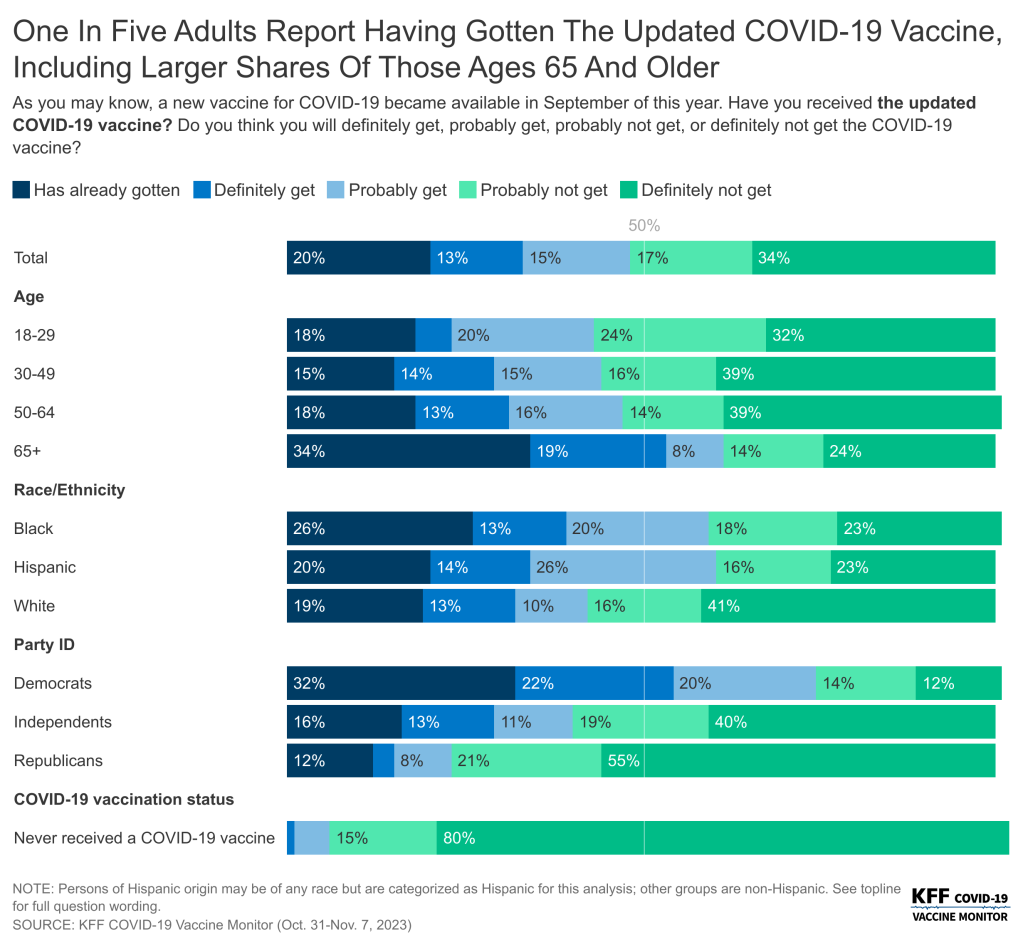The latest KFF COVID-19 Vaccine Monitor survey reveals that half (51%) of all adults nationally say they “definitely” or “probably” will not get the latest COVID-19 vaccine, with many saying that they aren’t worried about catching the virus.
One in five (20%) say that they’ve already gotten the new vaccine that became available in September, with an additional 28% saying they “definitely” or “probably” will get the new shot. The rest say they “definitely” or “probably” will not get the new shot – a large group that includes three-in-10 (31%) of all adults who previously got a COVID vaccine but now say they don’t plan to get the updated vaccine.
Most Black adults (59%) and Hispanic adults (59%) say they have either already gotten the vaccine or expect to get the new vaccine. In contrast, most White adults (58%) say they “definitely” or “probably” will not get it. Partisanship also continues to play an outsized role in vaccine attitudes. For example, eight-in-10 (80%) White adults who identify as Republicans say they do not plan to get the new vaccine – more than twice the share of White adults who identify as Democrats (29%).

Among previously vaccinated adults who have not yet gotten latest vaccine, half (52%) cite a lack of concern about getting the virus as a reason. Fewer say being too busy (37%), waiting to get it later (32%), or having had bad side effects after a previous dose (27%) are all reasons why they haven’t gotten the new shot.
About one-in-six (16%) say that they can’t afford to take time off work to get the vaccine, including more than a third (35%) of Hispanic adults and one-in-five (22%) Black adults. About one-in-eight (13%) cite not being able to get a vaccine appointment as a reason for not getting the new shot.
Heading into the fourth holiday season since COVID-19 emerged, most people are not too worried about its potential impact on themselves or their friends and families, the survey shows.
For instance, three quarters (74%) of the public say that they are “not too worried” or “not at all worried” about getting COVID-19 over the holidays, almost three times the share who are “very” or “somewhat” worried (26%). At least two- thirds (68%) say that they are not worried about spreading the virus to people close to them, more than twice the share who are worried (31%).
The public is split on precautions being taken because of COVID-19 this fall and winter. Half (50%) of the public plans to take at least one of five potential precautions to reduce their risks during the fall and winter: Avoiding large gatherings (35%); wearing a mask in crowded places (30%); avoiding travel (25%); avoiding indoor restaurants (19%); or taking a COVID-19 test before visiting family and friends (18%). The other half plans to take none of those precautions.
People who are at least 65 years old – a group especially at risk of severe COVID-19 illness – are among the most likely to say that they’ve already gotten the new vaccine (34%), though they are no more likely than younger adults to say that they plan to take at least one of the five precautions.
Black (72%) and Hispanic (68%) adults are much more likely than White adults (39%) to say they plan to take at least one of those precautions. Similarly, Democrats (66%) are more than twice as likely as Republicans (29%) to say they plan to take precautions.
Designed and analyzed by public opinion researchers at KFF, the survey was conducted from October 31-November 7, 2023, online and by telephone among a nationally representative sample of 1,401 U.S. adults. Interviews were conducted in English and in Spanish. The margin of sampling error is plus or minus 4 percentage points for the full sample. For results based on other subgroups, the margin of sampling error may be higher.


Attractive section of content. I just stumbled upon your blog and in accession capital to assert that I get actually enjoyed account your blog posts. Anyway I will be subscribing to your augment and even I achievement you access consistently fast.
Blue Techker I’m often to blogging and i really appreciate your content. The article has actually peaks my interest. I’m going to bookmark your web site and maintain checking for brand spanking new information.
you are in reality a just right webmaster. The site loading velocity is incredible. It seems that you are doing any unique trick. In addition, The contents are masterwork. you have performed a wonderful task on this topic!
Normally I do not read article on blogs, however I would like to say that this write-up very forced me to try and do so! Your writing style has been amazed me. Thanks, quite great post.
Nice blog here! Also your site loads up very fast! What host are you using? Can I get your affiliate link to your host? I wish my site loaded up as quickly as yours lol